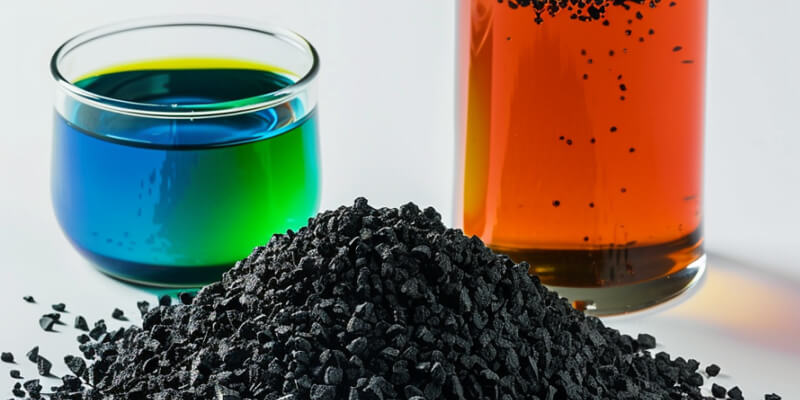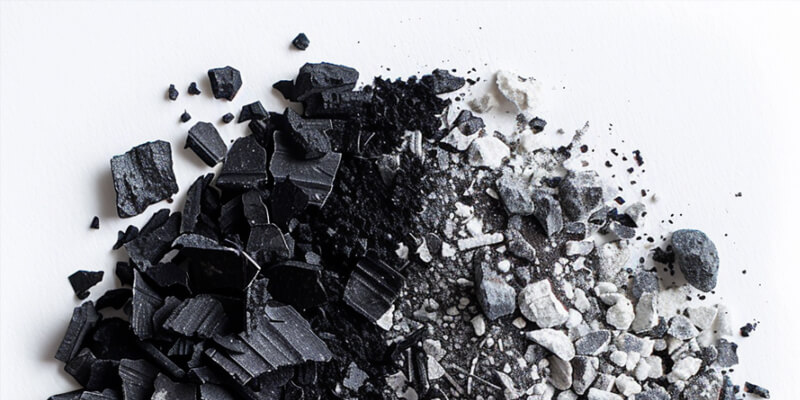Every year, activated charcoal saves thousands of lives. This black powder is a champion at activated charcoal detoxification. It captures ingested toxins effectively. Acting fast, it prevents poison from being absorbed into the body.
Key Takeaways
- Activated charcoal is a pivotal rescue agent in preventing poison absorption.
- Efficient against various ingested toxins, especially when administered post-ingestion.
- Not a one-size-fits-all detox solution; its effectiveness is toxin-specific.
- Can pose health risks if misused outside of its intended medical application.
- Crucial in medical emergencies if used promptly and correctly.
Understanding Activated Charcoal and Detoxification
Today, finding ways to remove toxins is more important than ever. Activated charcoal is praised for its ability to purify. It’s especially useful in treating some poisonings. Yet, there’s a lot of confusion about how it works for detox.
Origins and Production of Activated Charcoal
Activated charcoal is made from carbon-rich materials like coconut shells. These materials are treated at high temperatures with special gases. This process greatly increases the charcoal’s ability to absorb substances.
The Porous Nature of Activated Charcoal
The key feature of porous activated charcoal is its tiny holes. Just a gram can have a surface area over 3,000 square meters. This lets it trap a huge amount of toxins.
General Detoxification Myths vs. Reality
Though effective in emergencies, there are many myths about activated charcoal. Some think it can cleanse the body of all toxins and improve health. Yet, its real benefit is in treating overdoses, where toxins are still in the stomach.
It’s tempting to think of activated charcoal as a miracle detox solution. But its effectiveness depends on what was swallowed, how soon it’s taken, and if it can stick to the toxin. Below is a summary showing where activated charcoal works and where it’s just a myth:
| Use Case | Effectiveness | Common Misconceptions |
|---|---|---|
| Acute poisoning treatment | Highly effective when administered promptly | N/A |
| Overdose on certain medications | Effective within a narrow time frame after ingestion | N/A |
| General health detoxification | Not supported by scientific evidence | Believed to remove unspecified toxins from the body |
| Alcohol detoxification | Ineffective due to rapid absorption of alcohol | Erroneously considered effective for hangover prevention |
Knowing when and how to use activated charcoal is key. This helps dispel myths and ensures it’s used right, based on science.
Toxins that Activated Charcoal Remove
The discussion on poison removal through activated charcoal efficacy is critical. It’s known for its power to limit ingested toxin absorption. Activated charcoal plays a key role in medical care. It’s vital to know which toxins it best fights. Some poisons bind well with activated charcoal. This helps stop them from entering the gut. Here is a list of toxins and how activated charcoal aids in emergency care.
| Toxin | Usual Response Time for Efficacy | Notes on Activated Charcoal Use |
|---|---|---|
| Acetaminophen | Within 1 hour of ingestion | Highly effective when administered promptly |
| Aspirin | Within 1 to 2 hours of ingestion | Quick response essential for maximum absorption |
| Carbamazepine | Within 1 hour of ingestion | Delay in treatment can lead to significantly reduced efficacy |
| Dapsone | Within 30 minutes to 1 hour | May require multiple doses due to sustained release in the body |
| Phenobarbital | Timing varies | Multiple-dose regimen may be considered |
This table shows a crucial fact about activated charcoal in poison removal. How fast it’s used is key to how well it works. Different toxins need it at different times. So, healthcare workers aim to use it fast and accurately assess each case. Knowing how fast a toxin is absorbed helps make sure activated charcoal works well.
Note: While activated charcoal can provide significant benefits for certain poisonings, every case must be assessed by healthcare professionals to determine the appropriate course of action.
Pharmacokinetics: How Activated Charcoal Works in the Body
The process of activated charcoal pharmacokinetics is key in poisoning treatment. After it’s given, it mainly works by sticking to toxins. This reduces their movement into our blood. This special action makes activated charcoal a powerful remedy.
Binding and Absorption of Toxins
Toxin binding is central to activated charcoal’s role in healthcare. Its large surface area allows it to catch many harmful substances. This stops toxins from getting through our gut into our blood. This step is crucial in stopping the harm from swallowed poisons.
Time Sensitivity of Activated Charcoal Administration
When we use activated charcoal matters a lot in treating poisoning. It works best within one hour after a toxin is taken. Quick use of activated charcoal helps lower the harm a toxin can do. This shows why fast action is vital in poison cases.
Dosing Considerations Based on Types of Ingested Poisons
Finding the right dose of activated charcoal is complex and depends on the poison type and amount. Doctors might use the patient’s weight or the poison’s specifics to decide the dose. When dealing with certain drugs, doctors may give more doses of activated charcoal. This helps get better results in poisoning treatment.
Common Poisons Neutralized by Activated Charcoal

The use of activated charcoal treatment in poison neutralization is widely praised. It’s highly effective against many common toxins found in everyday life. Medical experts use it quickly to stop poisons before they can do major harm.
| Over-The-Counter Drugs | Prescription Medications | Other Substances |
|---|---|---|
| Acetaminophen | Phenobarbital | Theophylline |
| Aspirin | Dapsone | Lithium |
| Ibuprofen | Quetiapine | Ethanol (limited) |
When we talk about activated charcoal treatment, knowing its limits is key. Not all substances can be tackled by it. For poison neutralization to work, the toxin’s type matters a lot. Plus, acting fast, preferably within an hour of poisoning, is vital.
Doctors must carefully assess poison cases. They consider what poison was taken, how much, and the patient’s health. The time since the poisoning occurred also plays a big role in the success of poison neutralization using activated charcoal treatment.
Prompt and accurate assessment of poisoning scenarios is imperative in deploying the full neutralizing power of activated charcoal to combat common toxins.
Limitations of Activated Charcoal in Toxin Removal
Activated charcoal works well in some cases but has limits. For example, activated charcoal limitations are clear when dealing with various toxins. It is really important for doctors and patients to know these limits. This helps stop any wrong beliefs about what activated charcoal can do.
Substances Unaffected by Activated Charcoal
Some substances don’t get caught by activated charcoal. Examples include certain metals, hydrocarbons, alcohols, and lye. Unaffected substances slip through because of their shape, size, or charge. These features don’t match up with activated charcoal’s binding sites.
Impact of Toxin Molecular Structure on Charcoal Effectiveness
The structure of a toxin matters for treatment with activated charcoal. Toxin molecular structure plays a big role. The adsorption process requires toxins to stick to charcoal’s surface. Only molecules with the right chemical traits can stick to it.
| Toxin Category | Examples | Affected by Activated Charcoal | Notes |
|---|---|---|---|
| Metals | Lead, Mercury | No | Molecules too small or lack binding sites |
| Alcohols | Ethanol, Methanol | No | High solubility in water reduces effectiveness |
| Hydrocarbons | Gasoline, Kerosene | No | Non-polar substances that do not easily bind |
| Acids/Alkalis | Hydrochloric acid, Sodium hydroxide | No | Extremes in pH level negate binding capability |
| Electrolytes | Sodium, Potassium ions | No | Ionic nature and water solubility limit adsorption |
Activated Charcoal in Medical Emergencies
Medical emergencies caused by swallowing toxic substances can be serious. The quick and smart use of activated charcoal administration can help save lives. It’s a key tool in fighting poisoning, but it must be used quickly.

Yet, activated charcoal isn’t right for every case. Doctors must make careful choices, looking at what toxin was swallowed and when. They think about the risks and benefits before using activated charcoal.
It takes a team of health professionals to deal with poison control properly. They must prevent breathing in the charcoal, ensure the airway is safe, and check for any reasons not to use it. These steps help make sure the treatment works well.
Working with experts like toxicologists or the Poison Control Center is crucial. They help make sure the treatment fits the individual’s needs. This teamwork aims to give personalized care and follow the best poison management methods.
“In instances of acute poisoning, the timely use of activated charcoal could mean the difference between severe complications or a much more favorable prognosis.”
Activated Charcoal Beyond the Stomach: Air and Water Purification
Activated charcoal is amazing in many ways, not just for medical emergencies. It’s known for cleaning the environment too. This is seen in its use for air purification and water treatment. It grabs and gets rid of toxins, both inside our bodies and in our surroundings.
Removal of Toxic Heavy Metals from Water
Activated charcoal does a great job at pulling heavy metals out of water. It catches harmful metals like lead, mercury, and cadmium. These metals can be dangerous to our health if they’re in our drinking water.
Filtration of Harmful Organic Vapors in Work Environments
Activated charcoal is also key in filtering organic vapors. This is very important in places where people work. It stops harmful organic compounds from hurting air quality and worker health. Filters with activated charcoal help keep the air clean and safe for everyone.
| Contaminant | Removal Mechanism | Applications | Industry Usage |
|---|---|---|---|
| Heavy Metals in Water | Adsorption | Water Filters, Industrial Wastewater Treatment | Drinking Water Processing, Manufacturing Plants |
| Organic Vapors in Air | Adsorption and Reactivity | Respirator Masks, Air Cleaning Systems | Painting, Chemical Production, Construction |
In the end, activated charcoal plays a big part in tackling environmental issues. It’s vital for air purification and water treatment. This shows how versatile it is in making our planet cleaner and safer.
Conclusion
Activated charcoal is a unique player in the world of medical tools and remedies. It’s especially known for treating poisonings effectively. Additionally, it plays a big role in cleaning air and water, showing its versatility and value in public health.
However, activated charcoal does have its limits. Understanding both its powers and weaknesses is crucial. Its success depends on the toxin involved, how quickly it’s used, and the situation. It’s not a magical cure, but with doctors’ advice, it becomes a key emergency and environmental tool.
Activated charcoal is a vital part of emergency medicine and keeping our environment clean. Its use shows a deep commitment to health and safety among professionals and the public. By using it wisely, we improve our ability to handle toxic threats and protect our health.
From the Author:
Activated charcoal is a remarkably effective emergency treatment for certain poisonings, but it’s important to be aware of its potential side effects and interactions. Constipation and black stools are common. In more serious cases, it can cause vomiting or, if accidentally inhaled, lung complications.
Additionally, activated charcoal can interfere with the absorption of certain medications. It’s crucial to inform your doctor about all medications you’re taking before using activated charcoal, especially if you take regular prescriptions. They can advise on timing and possible temporary dosage adjustments.
Remember, activated charcoal is a powerful tool, but it must be used under professional guidance. In cases of suspected poisoning, always seek immediate medical attention.
FAQ
What toxins does activated charcoal remove?
Activated charcoal can remove some ingested toxins like over-the-counter drugs, including acetaminophen and aspirin. It also works on prescription medicines like phenobarbital and dapsone. This is if it’s used soon after the toxins are taken.
How is activated charcoal produced and how does its porosity aid in detoxification?
Activated charcoal is made by burning carbon-rich materials like wood. Then, it is treated to make it more porous. This increases its surface area, which helps it bind with toxins better, aiding in detoxification.
Can activated charcoal support general body detoxification?
No, activated charcoal doesn’t help with general body detox. There’s no science backing up this idea. However, it is helpful in certain medical situations, such as treating some poisonings and drug overdoses if used right away.
How does the dose of activated charcoal affect its efficacy in treating poisonings?
The right dose of activated charcoal is important. It depends on the poison’s amount or the person’s weight. It works best if used within an hour after the poison is taken. In bad cases, more doses may be needed, but doctors should oversee this.
Are there common poisons that activated charcoal is unable to neutralize?
Yes, some substances can’t be tackled by activated charcoal. These include metals, hydrocarbons, alcohol, and very acidic or alkaline things. The structure and type of toxin affect how well charcoal can work on them.
What are the limitations of activated charcoal in toxin removal?
Activated charcoal can’t capture some substances. It doesn’t work on metals, alcohol, hydrocarbons, or very acidic or alkaline things. The toxin’s structure affects how well-activated charcoal can remove it.
In what ways is activated charcoal used in medical emergencies?
During medical emergencies, activated charcoal helps by sticking to toxins and stopping them from being absorbed. Quickly using it is crucial. Medical teams, including poison experts, often manage its use.
How does activated charcoal contribute to air and water purification?
Activated charcoal also helps clean water and air. It takes toxic metals out of water and traps harmful vapors in air filters. This makes it vital for public health and industry.




